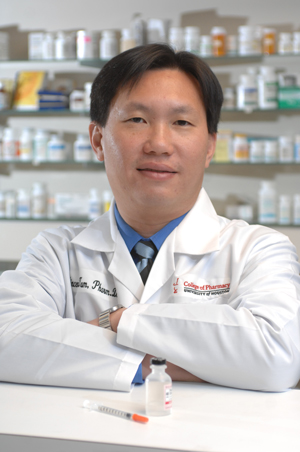Research News
Polymyxin Misperceptions
Tam Earns SIDP Paper of Year Award for Study Questioning Perception of 'Safer' Antimicrobial for Resistant Infections
UH College of Pharmacy Professor Vincent H. Tam, Pharm.D., BCPS-AQ (ID), has earned the 2014 Pharmacotherapy Paper of the Year award from the Society of Infectious Diseases Pharmacists (SIDP) for his translational research challenging the perception of a "safer" choice between two "last resort" antimicrobial drugs used to treat multidrug resistant infections.
 Presented Sept. 5 during the SIDP Annual Meeting in Washington, D.C., the award recognized Tam's paper published in the May 2014 issue of the peer-reviewed Journal of Antimicrobial Agents and Chemotherapy. The results of Tam's project call into question clinicians' use of colistin (also known as polymyxin E) vs. the use of the closely related polymyxin B, presumably due to a perceived benefit of a better safety profile with colistin. Clinically available since the 1960s, the polymyxins are a class of drugs known to be effective against several types of multidrug-resistant bacteria but generally considered antimicrobials of "last resort" due to their reported higher incidence of nephrotoxicity that can result in kidney damage in patients.
Presented Sept. 5 during the SIDP Annual Meeting in Washington, D.C., the award recognized Tam's paper published in the May 2014 issue of the peer-reviewed Journal of Antimicrobial Agents and Chemotherapy. The results of Tam's project call into question clinicians' use of colistin (also known as polymyxin E) vs. the use of the closely related polymyxin B, presumably due to a perceived benefit of a better safety profile with colistin. Clinically available since the 1960s, the polymyxins are a class of drugs known to be effective against several types of multidrug-resistant bacteria but generally considered antimicrobials of "last resort" due to their reported higher incidence of nephrotoxicity that can result in kidney damage in patients.
"Due to the slow pace of new antimicrobials entering the marketplace and the increase of drug resistance among pathogens, we must continue to re-examine ways to better utilize currently available antimicrobial agents such as the polymyxins," Tam said. "Colistin is more commonly used, but polymyxin B is pharmacokinetically more reliable and has other dosing advantages. The conversion of colistin from the prodrug is erratic; in patients with normal kidney function, more than 50 percent of the dose given would be eliminated before conversion, which means it's more difficult to achieve the desired concentration necessary to both inhibit control the infection while also avoiding damage to the kidney."
Tam's team conducted both in-vitro experiments using mammalian kidney cells exposed to each of the drugs as well as a retrospective analysis of 200 patients who were treated with one of the drugs at hospitals in Houston and New York City. In both the in-vitro experiments and the retrospective patient analysis, the project team found no indication that polymyxin B - the less frequently used drug - was more toxic to the kidneys than colistin/polymyxin E.
"In fact, our analysis indicated that the prevalence of nephrotoxicity was about 55 percent in colistimethate, compared to about 21 percent with Polymyxin B," Tam said. "Our results have already been generating inquiries from clinicians across the country who are evaluating the potential of adding polymyxin B into their drug formulary."
In nominating Tam for the award, UHCOP colleague and department chair Kevin Garey, Pharm.D., M.S., noted, "This paper provided revolutionary insights on the pharmacology of polymyxins, facilitating a much desired evidence-based approach to improvement in patient care."
Tam's project was supported by a $450,000 National Institutes of Health research grant awarded in 2010. The honored paper, entitled "In Vitro Assessment and Multicenter Cohort Study of Comparative Nephrotoxicity Rates Associated with Colistimethate versus Polymyxin B Therapy," was coauthored by (first author) Kady Phe, Pharm.D. ('12), CHI St. Luke's Health/Baylor St. Luke's Medical Center/UHCOP infectious diseases pharmacy fellow and lead author; Yuman Lee, Pharm.D., BCPS, clinical pharmacist at Maimonides Medical Center in Brooklyn, N.Y.; Patrick M. McDaneld, Pharm.D., Epic pharmacy operational expert at Houston Methodist Hospital; Nishant Prasad, M.D., an infectious diseases attending physician at New York Hospital Queens; Taijun Yin, UHCOP reseach staff member; Deborah A. Figueroa, Pharm.D., infectious disease clinical pharmacist at New York Hospital Queens in Flushing, N.Y.; Jessica M. Cottreau, Pharm.D., a former UHCOP faculty member now at Rosalind Franklin University; and Ming Hu, Ph.D., UHCOP professor of pharmaceutics.